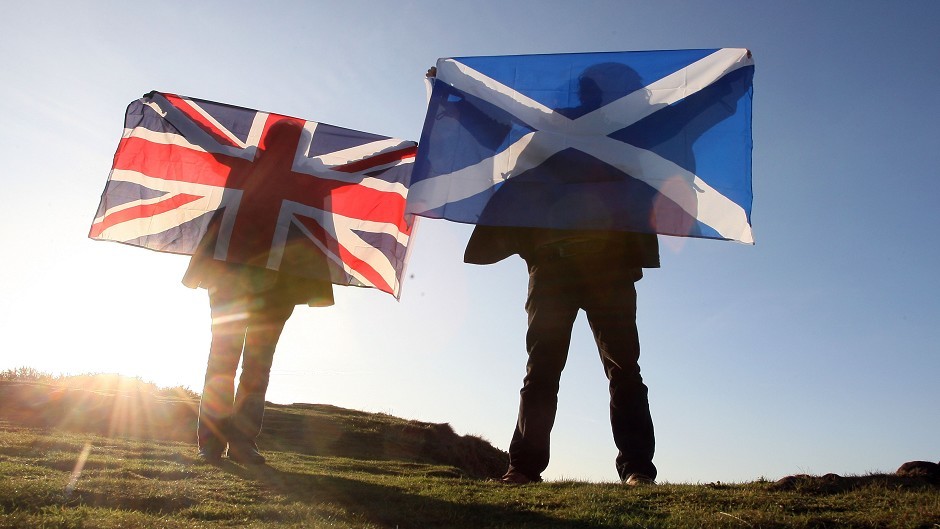The battle for Scotland’s future has entered the final straight.
A month today millions of people will go to the polls and answer the question “Should Scotland be an independent country”.
As citizens of these islands we should be deeply proud that no blood has been spilt during modern times over this hotly contentious issue.
Our example should shine as a beacon of hope across the world and inspire others in more troubled and divided nations.
As an observer of this debate, I honestly believe those campaigning on both sides – at the sharp end, not numbskull keyboard warriors in darkened bedrooms – are largely good, decent people who have one thing in common.
They all want to improve this country for the better and merely have different, albeit sincerely held, views on how to best achieve that.
The latest opinion polls suggest that the gap between the two sides is narrowing.
A YouGov survey of more than 1,000 people showed 43% backed independence – the highest level of backing for a ‘yes’ vote to date which reflects a 4% increase on the last poll carried out by that organisation.
It puts support for the union at 57% – both results exclude undecided voters – which is a fall of 4%.
Will the nationalists ever take a lead in the opinion polls? It is hard to say but never say never because the SNP were behind at this stage in the 2011 Scottish Parliament election campaign and shocked the nation by achieving a stunning victory.
But this is not an ordinary election – the decision is irreversible – and the stakes could not be higher
Both sides are ramping up the impact of the consequences of a “yes” and “no’” vote to try and win the hearts and minds of undecided voters.
The NHS in Scotland has become a key battle ground with the Scottish Government arguing that the threat of NHS privatisation south of the border would lead to a reduction in funding for heath care in this country.
Ministers argue that putting the NHS in England and Wales into private hands would lead to less public money being invested and the knock–on effect would be a reduction in cash coming to Scotland through Barnett consequentials.
This is a compelling argument to an extent because any perceived threat to Scotland’s NHS – the jewel in the crown of public services – will go down very badly with voters.
Of course the unionist parties have cried foul and accused the SNP Government of scaremongering – boot on the other foot stuff here – given health is a fully devolved issue.
But I cannot help but think this is too little too late from the nationalists and a last ditch attempt to divert attention away from their difficulties over currency.
People I discuss this issue with are genuinely concerned about the impact a currency union veto will have on mortgages and loans.
But in saying that I am not entirely convinced this isn’t a campaign tactic given both governments have already agreed, in law, to find a workable solution that serves the best interests of everyone.
Most Scottish schools have now returned after the summer break and no doubt the debate will be a hot topic of conversation amongst savvy pupils.
As part of the Edinburgh Agreement, the Scottish Government secured the right to give 16 and 17-year-olds the vote but I cannot help but feel this could backfire.
Successive opinion polls carried out after debates in schools suggest the majority of people back the union.
Perhaps this reflects their parent’s voting intentions or maybe, as children of devolution – they have never not known a Scottish Parliament – they feel they already have the best deal going.
Youngsters are also less likely to remember the impact of Margaret Thatcher’s Conservative government on Scotland and will be less bitter for it.
In fact the SNP narrative that independence meant people will always get the government they vote for might not play out that well with 16-year and 17-year-olds given the Labour Party has governed at Westminster and Holyrood for most of their lives.
There are no answers to the majority of questions people have about independence – most things are subject to negotiation after a ‘yes’ vote.
Nobody really knows what the future holds – the only substantive guarantee is there are no guarantees.
The question is this – are things so bad in this country that we need to sever a 307-year political union?
Or can real changes to benefit the majority, not just the minority, be made through sheer political will while remaining part of the UK?
The idea of starting afresh and designing structures and services to increase prosperity for all is very seductive but is the cost of upheaval and uncertainty worth it?
The decision people make at the ballot box on September 18 will come down to commonsense, patriotism, emotion and the arguments you choose to trust most.
Whatever the result, the debate will have a tremendous impact on the UK as a whole.
And whoever wins must win well – a 51% 49% spilt is maybe a legal victory but not a credible, moral one.
It will leave the country divided and I suspect it will take a lot more than a Church of Scotland reconciliation service to heal the rifts.
